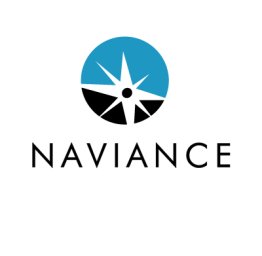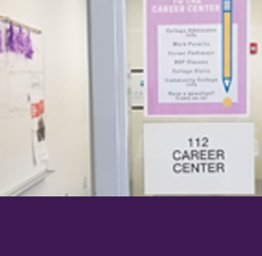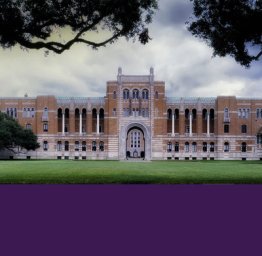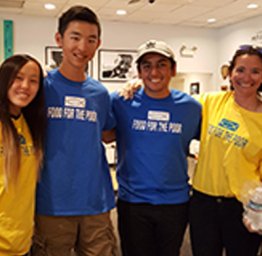Throughout your high school journey, it will be important to think about your life after high school. What are you interested in? What are you good at? What will people pay you for? Reflect on these questions, and seek to get involved in researching and participating in activities you're passionate about. Participate in community service, join academic/social clubs, get a part-time job, or job shadow/intern with a professional at their work. It will not only help you clarify your career interests, but it will also help you with determining college majors and finding colleges of best fit!

There are many educational paths you can take that can help you reach your desired goals; does your career of interest require an Associate's Degree from a community college or a Bachelor's Degree from a 4-Year University? Do your research and contact your counselor for further assistance.
Portola High School Codes
County-District School (CDS) Code: 30-73650-013340
CDS School Code only: 0133405
College Board School Code: 050266
Click on the Portola College App Resource Guide below for everything you'll need to know to complete your college applications:
Types of College Degrees
Certificates
These are non-degree offerings in technical and vocational fields of study. A certificate generally leads directly to full or part-time employment in an occupational field. There are numerous certificate programs offered by the community college system. Visit the school websites for a complete listing of Degree and Certificate Program offerings. Some examples are:
| Catering Certificate Program | Digital Photography | Emergency Medical Technician |
| Civil Computer-Aided Design | Electrician Trainee | Medical Laboratory Technician |
| Design Model Making | Food Service |
Associate Degree (AA, AS)
Two types of Associate Degree programs are offered by the community college program. In general, the Associate Degree program takes 2 years to complete. Visit the school websites for a complete listing of Degree and Certificate Program offerings.
- Technology and Vocational Degrees: Generally completed in two years. Examples include AS Degrees in Paralegal Studies, Digital Media Technologies, Business Management.
- Transfer Degrees: Prepare students to transfer to a four year university to complete a bachelor’s degree. Examples include AA degrees in Liberal Studies, European History, Political Science, etc.
Bachelor’s Degree (BA, BS)
This requires 4-5 years of study. Students must complete general education courses, courses in a major field of study, and electives.
- Bachelor of Arts degree (BA): Awarded for majors in the humanities and the arts.
- Bachelor of Science degree (BS): Awarded for majors in science, tech, engineering, and math.
Masters Degree: (MA, MS, MBA. MFA)
This degree takes about two years to complete beyond a Bachelor’s Degree and is often more focused in one area of study.
- Master of Arts degree (MA): Awarded for majors in the humanities and the arts.
- Master of Science degree (MS): Awarded for majors in science, tech, engineering and math.
- Master of Business Administration (MBA): Awarded for majors in business administration.
- Master of Fine Arts (MFA): Awarded for majors in the arts.
Doctorate Degree (Ph.D., Ed.D, and DPH)
Coursework and independent research is done after completing a bachelor’s degree and culminates in a dissertation or formal presentation.
- Doctor of Philosophy (Ph.D.): Awarded for humanities, arts and science majors.
- Doctor of Education (Ed.D.): Awarded for education majors.
- Doctor of Public Health (DPH): Awarded for majors in public health administration.
Professional DegreeS
(MD, DDS, JD, etc): Requires completion of at least several years of advanced study. Examples include:
| DC: Chiropractor | DDS or DMD: Dentistry |
| JD: Law | MD: Medicine |
| OD: Optometry | DVM: Veterinary Medicine |
Factors to consider when selecting colleges
- SIZE – Size of colleges range from very small (500 students) to very large (>35,000 students)
- LOCATION – Some students prefer to attend college close to home while others want to experience a new environment and would be able to adjust and function as well or better farther away.
- TYPE– Colleges are either privately or publicly funded. Private colleges may or may not be religiously affiliated which may add certain expectations for students who attend that college.
- COST – This includes tuition, fees, room and board, and travel expenses. Tuition at state-supported schools is substantially lower than that of private schools. Students who wish to attend out-of-state public schools pay out-of-state tuition fees, which in most cases equate with tuition at a private institution. However, private institutions often provide significantly more financial aid.
- ADMISSION REQUIREMENTS – In addition to presenting acceptable scores on entrance exams, some colleges require a certain number of units in high school preparatory courses, as well as essays, recommendations, or interviews.
- CURRICULUM AND DEGREES OFFERED – A sizable consideration for choosing a college should be the availability of adequate programs in the area you intend to study, as well as the requirements for achieving a degree in your major at that particular college.
- HONORS – Distinctive academic programs may be available to students who meet requirements.
- FACILITIES – Some students are interested in the quality of the facilities, including classrooms, laboratories, libraries, residence halls, etc.
- FINANCIAL AID – Along with federal and state aid, many colleges offer institutional financial aid to bridge the gap between the cost of education and the expected contribution of the family. Sme private colleges even offer financial aid that places the cost in line with that of public colleges.
- EXTRACURRICULAR ACTIVITIES – The college should offer a variety of activities which are of interest to you, e.g., student government, social organizations, athletic or intramural activities, etc.
- FAMILY TRADITION– Your family may have strong ties to a particular college.











